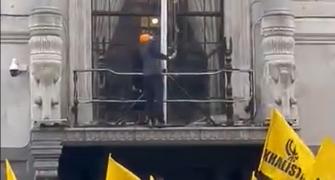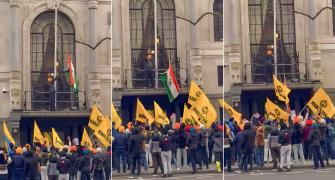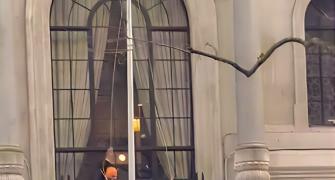Broadening its probe into attempts to vandalise the Indian mission premises in London, the National Investigation Agency on Monday released five videos and sought the help of the general public in identifying individuals involved in the violent protests there in March this year.

Officials spokesperson of the agency posted links to five videos of the incident that occurred on March 19 on its Twitter handle and urged the people to provide any information regarding the persons seen in the footage to the NIA.
The NIA said in a statement that the CCTV footage of the attack by anti-national elements on the High Commission of India in London on March 19 this year has been uploaded.
"All the members of public are requested to provide any information regarding the persons seen in the footage to the NIA in public interest," the statement said, adding the information would be kept secret.
The agency also provided a WhatsApp number +917290009373 for conveying the information.
This comes after a team of the NIA visited London to get details of the case besides interacting with officials of the Scotland Yard, officials in know of the developments said.
The agency took over the probe from the Special Cell of the Delhi Police which had registered a case under the Unlawful Activities (Prevention) Act and the Prevention of Damage to Public Property Act as it involves illegal activities carried out by certain people holding Indian nationality abroad.
Pro-Khalistani protestors tried to vandalise the Indian High Commission in London and pulled down the national flag while holding protests outside the high commission complex on March 19.
It happened a day after Punjab Police launched a crackdown against radical preacher Amritpal Singh in Punjab.
The Counter-Terrorism and Counter Radicalisation unit of the Ministry of Home Affairs had handed over the case to the NIA and the decision was taken after Union home secretary Ajay Bhalla held a meeting with representatives of the British government in April this year.
In the London incident, the tricolour flying atop the Indian high commission was grabbed at by a group of protesters waving separatist Khalistani flags and chanting pro-Khalistani slogans, leading to an arrest.
Officials from the Mission had said the "attempted but failed" attack was foiled and that the tricolour was now flying "grander". The Metropolitan police said that two members of security staff sustained minor injuries which did not require hospital treatment.
India had summoned the British deputy high commissioner based in New Delhi and demanded an explanation over the complete "absence of security".
In a strongly-worded statement, the Ministry of External Affairs had said India finds "unacceptable" the indifference of the UK government to the security of Indian diplomatic premises and personnel.
Earlier, Union home secretary Bhalla had flagged the issue with a UK delegation which was led by permanent secretary, home office, Sir Matthew Rycroft.
He had "specifically" conveyed New Delhi's concerns on the misuse of the UK's asylum status by pro-Khalistani elements to abet terrorist activities and requested better cooperation, increased monitoring of extremists and proactive action.
India's concerns over the breach of security at the Indian High Commission were also emphasised in that meeting.









